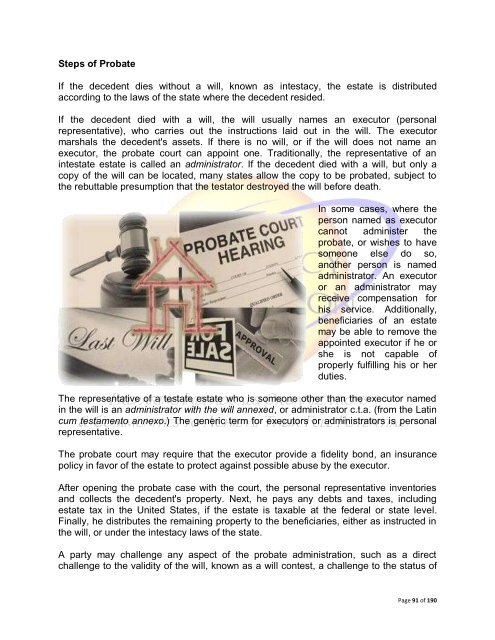Wills, Trusts & Estates
Wills, Trusts & Estates
Wills, Trusts & Estates
Create successful ePaper yourself
Turn your PDF publications into a flip-book with our unique Google optimized e-Paper software.
Steps of Probate<br />
If the decedent dies without a will, known as intestacy, the estate is distributed<br />
according to the laws of the state where the decedent resided.<br />
If the decedent died with a will, the will usually names an executor (personal<br />
representative), who carries out the instructions laid out in the will. The executor<br />
marshals the decedent's assets. If there is no will, or if the will does not name an<br />
executor, the probate court can appoint one. Traditionally, the representative of an<br />
intestate estate is called an administrator. If the decedent died with a will, but only a<br />
copy of the will can be located, many states allow the copy to be probated, subject to<br />
the rebuttable presumption that the testator destroyed the will before death.<br />
In some cases, where the<br />
person named as executor<br />
cannot administer the<br />
probate, or wishes to have<br />
someone else do so,<br />
another person is named<br />
administrator. An executor<br />
or an administrator may<br />
receive compensation for<br />
his service. Additionally,<br />
beneficiaries of an estate<br />
may be able to remove the<br />
appointed executor if he or<br />
she is not capable of<br />
properly fulfilling his or her<br />
duties.<br />
The representative of a testate estate who is someone other than the executor named<br />
in the will is an administrator with the will annexed, or administrator c.t.a. (from the Latin<br />
cum testamento annexo.) The generic term for executors or administrators is personal<br />
representative.<br />
The probate court may require that the executor provide a fidelity bond, an insurance<br />
policy in favor of the estate to protect against possible abuse by the executor.<br />
After opening the probate case with the court, the personal representative inventories<br />
and collects the decedent's property. Next, he pays any debts and taxes, including<br />
estate tax in the United States, if the estate is taxable at the federal or state level.<br />
Finally, he distributes the remaining property to the beneficiaries, either as instructed in<br />
the will, or under the intestacy laws of the state.<br />
A party may challenge any aspect of the probate administration, such as a direct<br />
challenge to the validity of the will, known as a will contest, a challenge to the status of<br />
Page 91 of 190

















